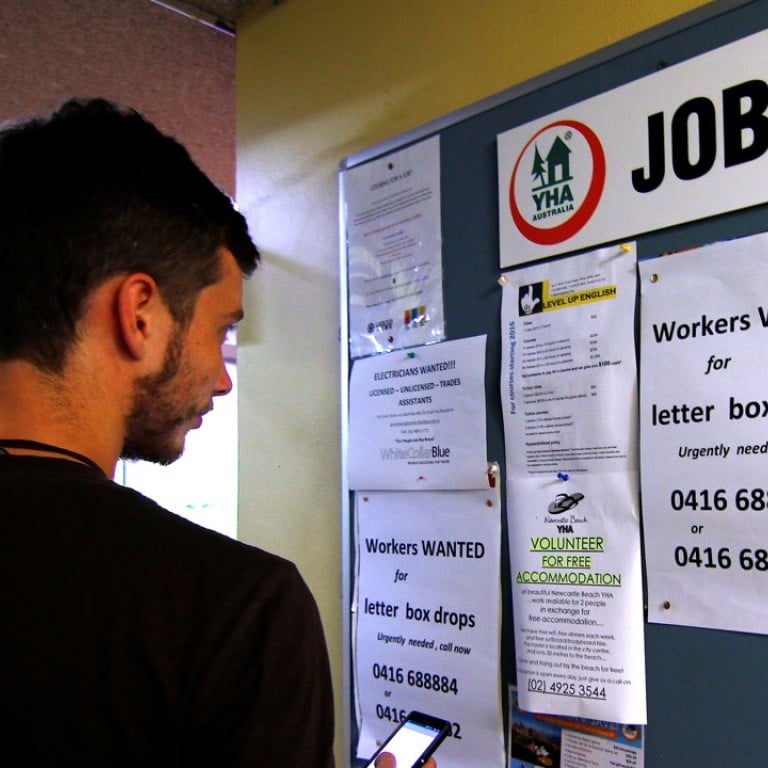
Wage-theft ripping off a third of foreign workers, backpackers in Australia, study finds
- Many earned just US$8.50 an hour or less
- Survey received 4,322 valid responses from people from 107 countries who had worked in Australia on a temporary visa
The most comprehensive study to date of wage theft and working conditions among international students, backpackers and other temporary migrants in Australia has found almost a third earned A$12 (US$8.50) an hour or less, around half the casual minimum wage.
The survey also found large-scale wage theft was worst in fruit and vegetable-picking and farm work, where 15 per cent of workers earned A$5 an hour or less. Almost a third (31 per cent) earned A$10 an hour or less.
The findings were published in the report titled Wage Theft in Australia, published on Monday and written by senior law lecturers Bassina Farbenblum, from the University of New South Wales, and Laurie Berg, from the University of Technology Sydney.
The online survey was conducted between September and December 2016 yielding 4,322 valid responses from people representing 107 countries. It was open to anyone who had worked in Australia on a temporary visa and made available in 13 languages.
The analysis of the results shows that for every 100 underpaid migrant workers, only three went to the fair work ombudsman. Of those, more than half recovered nothing.
“The study dispelled the misconception that temporary migrants are underpaid because they are unaware of minimum wage rates in Australia,” the report said.
“Though they may not have known their precise entitlements, the overwhelming majority who earned A$15 or less knew that the legal minimum wage was higher. However, they perceived that few people on their visa can expect to receive minimum wages under Australian labour law, with at least 86 per cent of believing that many, most or all other people on their visa are paid less than the basic legal minimum wage.”
There were several barriers to reporting wage-theft, Farbenblum and Berg found. Many were unsure of the process or believed it would be too difficult to recover the wages, and more than a quarter said they would not speak up because of fears of losing their visa.
“Four per cent of participants indicated that someone in their workplace had threatened to report them to the Immigration Department,” the report found. “This included 92 temporary migrants (3 per cent) who had been threatened by their employer or a manager, which was likely calculated to induce compliance with particular work conditions and/or to deter complaint.”
Exacerbating exploitative conditions were “deposits” 5 per cent of survey respondents reported having to pay to employers for a job during their time in Australia, which they were told would be returned when they left. A further 194 participants said they paid a potentially unlawful training or other fee to their employer, with some respondents paying more than A$900.
The report concluded that improved support services and immigration safeguards would encourage more workers to report their employer and to successfully seek redress, and that doing so would be crucial to ensuring Australia remained an attractive destination for international students and backpackers.
“Our study confirms that Australia has a large, silent underclass of underpaid migrant workers,” Farbenblum said. “The scale of unclaimed wages is likely well over a billion dollars.”
The Unions NSW secretary, Mark Morey, said migrant exploitation was a “national shame that Australia must confront and fix”.
“All too often the people cleaning our offices, serving our meals or working a service station cash register are illegally ripped off,” he said.
“As a nation, we cannot keep averting our eyes and pretending this is not happening. The growth of contingent visas is actively preventing many workers with foreign passports from enforcing their labour rights.”
Morey called for a deportation amnesty for foreign workers while cases of workplace exploitation are investigated.
Tara Moriarty, president of United Voice Liquor and Hospitality, said for many international students the choice is stark. “Obey the law and go hungry, or work a cash-in-hand job,” she said.
“Many hospitality employers know this and they exploit it. This drives down wages and conditions across the entire industry and makes illegal underpayment the norm, rather than the exception.”

